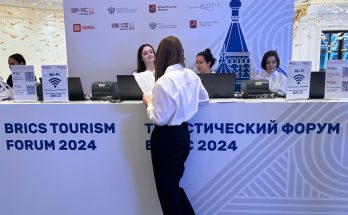It’s been a long-winding and tortuous journey for India-Pakistan relations this year, with the first signs of thaw appearing in the Paris winter amid the heated debate on global warming, and more frost melting in the sultry weather of Bangkok. Ufa-Paris-Bangkok-Islamabad is an unusual itinerary, except for those invested in the high-risk game of steering India-Pakistan relations in the right direction.
Climate Changing: The Road to Bangkok
Now, we know that 160 seconds of “guftagu” (tete-a-tete) between the leaders of India and Pakistan on the sidelines of a multilateral meet can’t be dismissed as mere exchange of courtesies. The climate-change moment that was captured in the riveting photograph of PM Narendra Modi and PM Nawaz Sharif sitting on a sofa in a thoughtful huddle in Paris now augurs a real change in atmospherics, with the unexpected talks between National Security Advisers of the two countries in the Thai capital on December 6. Accompanied by Foreign Secretary S. Jaishankar, India’s NSA Ajit Doval held talks with Pakistan’s NSA Naseer Janjua and FS Aizaz Ahmad Chaudhry in Bangkok in an attempt to map the way ahead for resuming the dialogue process, which remains embroiled in mutual accusations and visceral suspicion. The joint press statement emanating from the Bangkok meeting is a throwback to the Ufa meeting between the prime ministers of the two countries in July in terms of its strenuously optimistic and statesman-like tone. “Discussions were held in a candid, cordial and constructive atmosphere. They were guided by the vision of the two leaders for a peaceful stable and prosperous South Asia,” said the statement.
Focus on terrorism and J&K
However, there is a seeming deviation from the text of the Ufa statement as this time around the NSAs discussed not just terrorism, but also Jammu and Kashmir. “Discussions covered peace and security, terrorism, Jammu and Kashmir, and other issues, including tranquility along the LoC,” said the statement.
The explicit mention of Jammu and Kashmir as a subject of discussion has surprised experts and critics in India as the NSA-level talks in New Delhi were cancelled at the last minute in August due to a sharp clash in interpretation of the Ufa understanding. At that time, the Pakistani side had adamantly insisted that the NSA-talks should also include J&K, whereas the Indian side stuck to its position that the talks should focus exclusively on terrorism. Pakistan’s provocative gesture of setting up a meeting with Kashmiri separatist leaders with their NSA finally led to the cancellation of the talks, leading to a prolonged chill between the increasingly estranged neighbours.
The Indian side has justified including discussion on Jammu and Kashmir in the context of continuing cross-border transgressions and the attack in Udhampur. Spin-doctoring apart, it’s a sensible move as the exclusion of Kashmir from the Ufa statement had triggered a backlash from the powerful deep state in Pakistan – the military-ISI establishment. Besides, the Ufa statement had also mentioned the willingness to engage on all outstanding issues.
No grandstanding, please? Get real
It’s not clear what has materially changed on the ground between August and December to trigger a change of heart, leading to the breakthrough meetings in Paris and Bangkok. The only plausible explanation is a sobering realisation on parts of the top leadership of both countries that they can’t go on indulging in posturing ad infinitum, but will have to perforce find some ways to re-engage, albeit in a limited manner, for their respective national interests.
Journey to Pakistan: The Way Ahead
The seriousness of the Paris gamble will, however, become clear in the kind of discussions External Affairs Minister Sushma Swaraj will have with the Pakistani leadership when she goes to Islamabad to participate in the ‘Heart of Asia’ conference, focused on the future of Afghanistan, on December 8. Going by the tenor of NSA-level talks in Bangkok, Swaraj’s visit could prove to be a potential game-changer in setting the stage for resuming some sort of limited engagement with Pakistan, at least in the near term, and paving the way for the big moment- PM Modi’s visit to Islamabad to attend the SAARC summit. But given the volatility inherent in India-Pakistan relations, Pakistan must seriously and sincerely deliver on its anti-terror pledge and ensure an atmosphere free from violence. Whatever semantic jugglery the power-that-be in Pakistan may resort to, the brutal fact is that the dialogue process can continue only, if it’s revived, till the next cross-border terror attack in India. You can’t have talks amid explosions and gunfire, as PM Modi said in his homespun way soon after taking charge last year.
And it will help a great deal if both sides can shun grandstanding, get real, talk sotto voce away from blazing headlines, and keep on the course of constructive engagement, as envisaged in the Bangkok thaw.
Author Profile

- Manish Chand is Founder-CEO and Editor-in-Chief of India Writes Network (www.indiawrites.org) and India and World, a pioneering magazine focused on international affairs. He is CEO/Director of TGII Media Private Limited, an India-based media, publishing, research and consultancy company.
Latest entries
 India and the WorldJuly 9, 2024Defying West, India sets $100 billion trade target with Russia
India and the WorldJuly 9, 2024Defying West, India sets $100 billion trade target with Russia India and the WorldJuly 5, 2024India at SCO: Takes swipe at Pakistan for cross-border terror, pushes alternative to BRI
India and the WorldJuly 5, 2024India at SCO: Takes swipe at Pakistan for cross-border terror, pushes alternative to BRI India and the WorldJune 14, 2024Modi’s Day 1 in Italy: Bonding with Britain, France
India and the WorldJune 14, 2024Modi’s Day 1 in Italy: Bonding with Britain, France India and the WorldJune 13, 2024G7 summit in Italy: Modi to showcase India as leader of Global South
India and the WorldJune 13, 2024G7 summit in Italy: Modi to showcase India as leader of Global South







